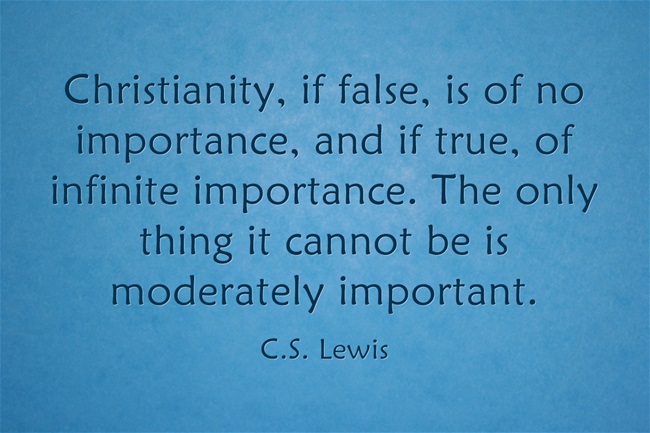An interesting title for a book. An interesting juxtaposition of terms to describe a person. Yet I can think of no better description to fit the persona of C.S. Lewis. Sure, he was many other things–a Christ-follower, an author, a professor, a friend–but all of those titles can be summed up in the way he approached life, in general. And that was as both a romantic and a rationalist.
This compendium of sorts contains essays centered around ideas that C.S. Lewis espoused. Or, rather, his thoughts on those ideas. Not a history book, not an biography, but rather more a theological examination of the air that surrounds the words of Lewis.
The writings of C.S. Lewis had an integral impact on my mind and the process of coming to belief in God. Opening “Surprised by Joy” was like reading my life. Pouring over “Mere Christianity” was like coming home. It would be fair to say that I would like to read pretty much anything that Lewis has written. In fact, in The Romantic Rationalist, John Piper alludes to a collection of Lewis’ essays that I’d never heard of before. Yes, I put it into my Amazon Wish List. Yes, it is out-of-print and is selling, used for $263.15. Yes, I contemplated selling platelets to get it.
So, I guess you could say that I kind of respect the guy.
Even with that enormous respect, though, there are a handful of times that I’ve read Lewis and thought “Hmmm. I wonder why he says that?”. The Romantic Rationalist helped me to sort out some of those instances. For example, Lewis’ views on the inspiration and authority of Scripture. This is a topic I’ve given much thought to. And, if one thinks about it too much, it can become down-right baffling. So I have to guard my mind against dwelling there for too long, because I can become spun up on it fairly quickly. Meaning, I can give sway to doubts. Too often, too quickly, too easily. I have to fight doubt, consistently. And, this is one area that fighting doubt plays a strong role, at least, in my mind.
Most evangelicals shy away from Lewis when it comes to discussing this topic. I’ll invite you to read the book to find out why. But I appreciate the authors of The Romantic Rationalist diving neck-deep into this and other areas where questions arise in regards to the theology of C.S. Lewis. Theology is important. Extremely so. And, it bothers me to not get it “right”. I want to practice sound theology. I want to adhere to solid doctrine. I want to participate in correct disciplines. But, I am not always going to get it “right”. Neither, necessarily, did C.S. Lewis, one of the most revered “thinkers” of our time.
There is some comfort in that. For one, it reminds me that Lewis, like all men, are just that–men. Fallible creatures. I need not put him on a pedestal, any more than I should put any person on a pedestal. Only God holds that status. And, while the writings of C.S. Lewis are and always will be of extreme importance to me, the writings of Scripture can never be replaced. No commentary, no essay, no brilliant work should ever overshadow God’s word. And, all things must be checked through scripture. Show me scripture.
Secondly, there is hope for me. I am not going to get everything right, but I can’t stop striving to learn. But we all must continually ask the questions that need to be asked. We must continually present our thoughts before God and shine the light of truth upon them so that we can make adjustments where needed. I think that is what C.S. Lewis strove to do; and, in doing so, we are privy to his honest thoughts, struggles, and wrestlings. He has given us a front row seat, through his writings, and we are richer for it.
The Romantic Rationalist is not solely about issues of questions that arise in regards to Lewis’ theology–not by a long shot. But, those sections that dealt with that were what stood out the most to me. Why, I think an entire book could be written on each of the chapters presented in this volume. There is even a chapter on food. Well-played.
This is a book that I think I will turn to repeatedly. An excellent book to have in one’s library–it opens up the discussion on key ideas and provides much fodder for further exploration and thinking.
*I received a review copy of this book from Crossway Publishers.
*Be sure to read the interview panel discourse at the end of the book, located in Appendix 2.

